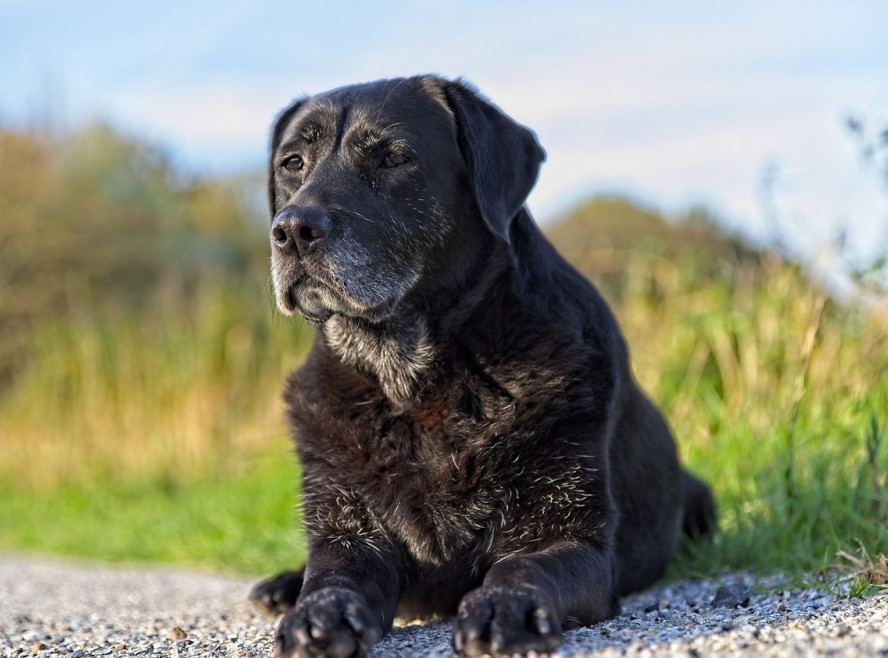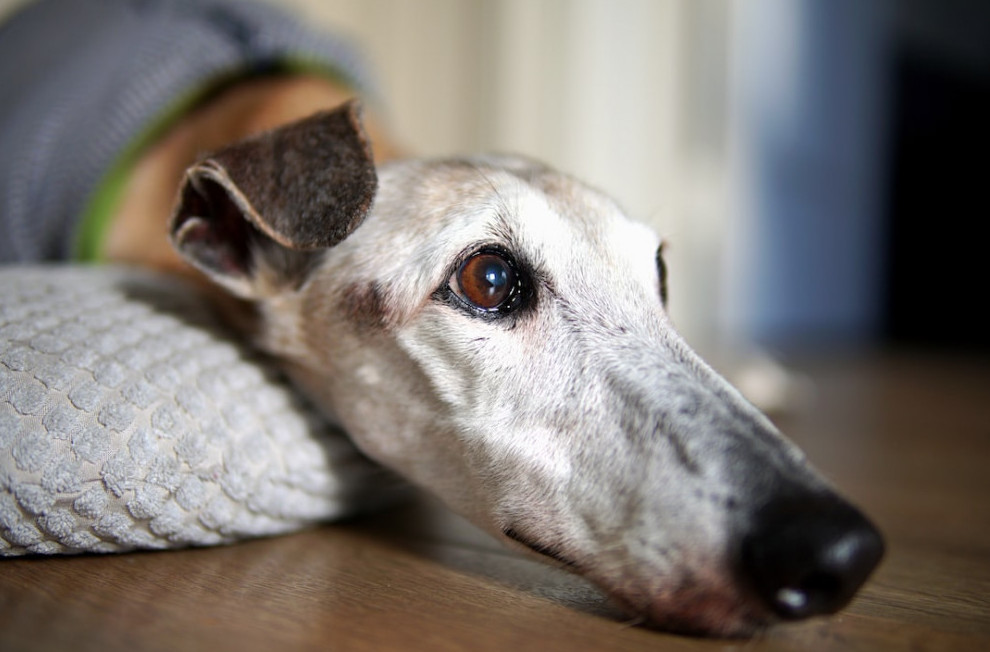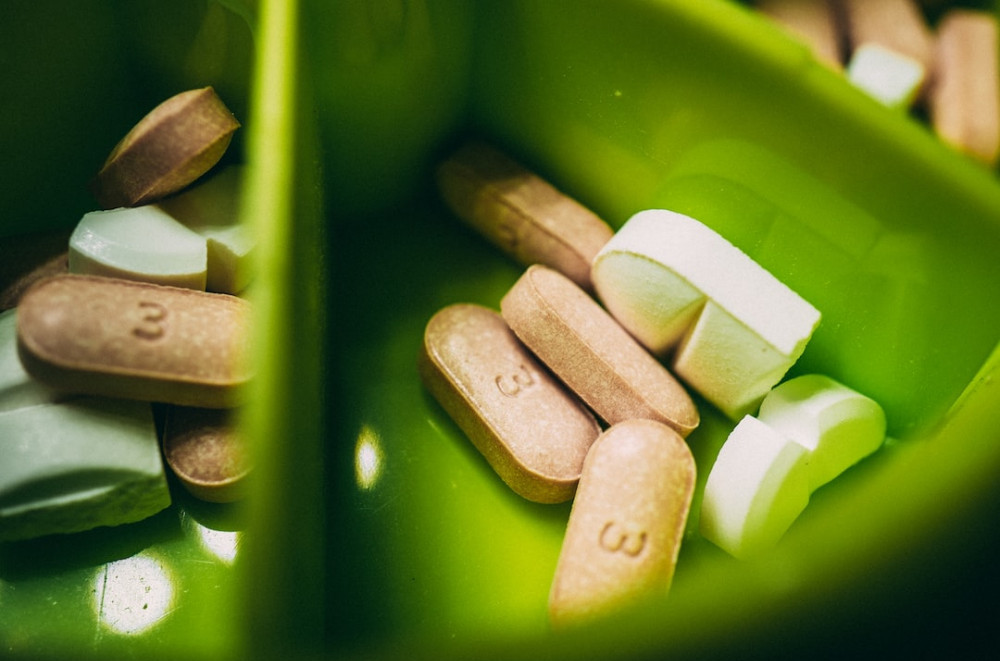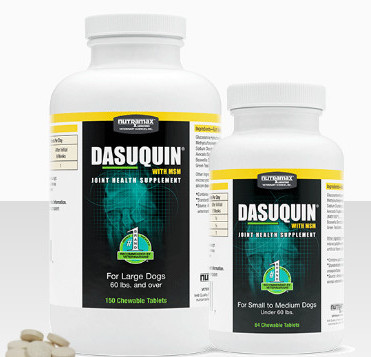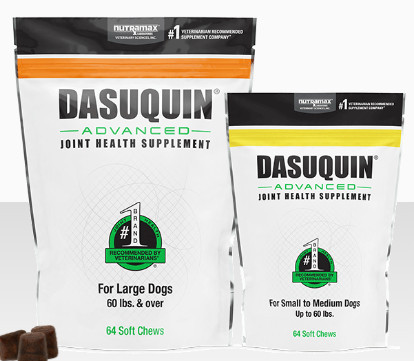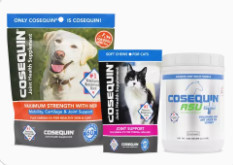For those of us that have senior dogs, another concern we need to consider is if they are carrying extra weight on their bodies. Not only do we need to help them maintain joint health, we need to make sure they stay at a healthy weight. If they gain weight, it can cause medical conditions and a lower quality of life. So, let’s discuss how to help my senior dog lose weight.
 What Causes Weight Gain in Senior Dogs?
What Causes Weight Gain in Senior Dogs?
There are a number of causes in weight gain for dogs in general, but I think it is especially important to maintain a healthy weight going into your dog’s senior years. Why? Healthy weight will help them live a longer, more quality life!
Possible causes of weight gain in your senior dog
Consuming More Calories Than Needed: Similar to humans, dog’s metabolisms change as they get older.
Not Exercising Enough: Your fur baby may be spending more time sleeping than running around like when they were puppies. Less exercise, means fewer calories burned.
Pregnancy: If you haven’t spayed your female, it is possible she may pregnant. Even as they age, they will still get an estrus cycle. It may not come as often; however, they can still get pregnant.
Retaining Fluid: This can be due to medical conditions such as tumors or diseases in the dog’s internal organs. It can also occur if your dog has a shunt placed in his/her liver or if they have a congenital heart condition. This will not look like your typical overweight belly…you will definitely want to talk to a vet if you notice this type of enlarged belly.
Bloat: This happens when your dog gobbles his or her food too fast. Your dog will tend not only to gulp their food down, but they also gulp excess air. This will also affect your dog’s heart rate, ability to breathe, and will cause pain in the abdomen. Please take your dog to the vet immediately as this is a life-threatening scenario.
Prescription Drugs: There are some drugs that will cause weight gain in your senior pup as well. Talk with your veterinarian to see if this is one of the reasons your dog is gaining weight.
Medical Reasons
Hypothyroidism: Yes, the dreaded thyroid issues that affect humans as well. Similar to humans, hypothyroidism can slow your dog’s metabolism and make him/her gain weight.
Cushing’s Disease: This disease is caused by an overproduction of glucocorticoid hormones that regulate protein, carbohydrates, and metabolism. There are three types of Cushing’s:
- Pituitary Cushing’s; Caused by a tumor in the pituitary gland, too much adrenocorticotropic hormone (ACTH) is produced. ACTH stimulates the adrenal gland on how much cortisol is released into the system. According to the VCA, this accounts for 85-90% of all cases.
- Adrenal Cushing’s: This condition is caused by a tumor on the adrenal glands to where it produces too much cortisol as well.
- Iatrogenic Cushing’s: Iatrogenic Cushing’s is caused by excessive steroid use over a long period. It may have been prescribed for a legitimate medical reason; however, if used for too long, it can create excessive cortisol which will cause weight gain.
Diabetes: “Sugar Diabetes” is the type of diabetes seen in most dogs where your dog’s metabolism has a hard time converting food into energy. It can cause a higher appetite and thirst, which in turn can cause weight gain…but…it can also cause weight loss. If you are concerned, please talk to your veterinarian immediately.
I have heard from many older humans that “getting old is not for the faint of heart (or the weak!)”. It always makes me giggle, but it also makes me think more about what I need to do to ensure my dogs stay healthy into their senior years (and cats), as well as myself.
Talk to Your Veterinarian
Even though there are so many causes that MAY affect your dog’s weight, it is of utmost importance to consult a veterinarian if there are any concerns. Your veterinarian will be able to examine your dog and do diagnostic tests to rule out certain causes; as well as diagnose your senior pup.
 Benefits to Helping My Senior Dog Lose Weight
Benefits to Helping My Senior Dog Lose Weight
Not only will your dog look great, he or she will feel much better when at a healthy weight. Your dog will also have additional health benefits that come with staying healthy.
1. Increased Energy: As your dog begins to lose weight, you will notice a difference in their energy level. (maybe even a little pep in their step!) Most dogs were bred for certain jobs such as herding, chasing away intruders, hunting, etc. These activities require energy, so when your senior dog loses weight, he or she feels more invigorated and able to do their job (even if it is really only running after a ball at that time!).
2. Lower Risk of Long Term Health Issues: This is an extremely important aspect to helping your senior dog lose weight. If the dog remains at a healthy weight through life, there is a lower risk of long term health issues such as diabetes, intestinal issues, skin conditions, heart disease, and even breathing issues.
3. Lower Risk of Arthritis:If your dog is overweight, the extra pounds put a lot of pressure on his or her joints and bone structure. As a senior, your dog may be prone to arthritis anyway; however, if he or she is overweight, the pain can be worse than if he or she is at a healthy weight.
4. A Possible Longer Lifespan: An overweight dog can see a decrease in lifespan due to the possible medical issues that arise. According to the AKC, dogs who are just 10% overweight have a 1/3 decreased lifespan as well as a higher propensity for heart, kidney, and liver disease.
As we can see, there are definitely benefits to helping our senior pups lose weight. We want them to live a good-long, healthy life with us, right?
Activities to Help My Senior Dog Lose Weight
When your senior dog is overweight, there are a few things you can do to help them lose weight. Here are a few activities that can help.
Increase activity slowly: You are probably able to tell that your overweight, senior dog moves a bit slower than the average dog. In this case, you will want to start slow when getting your dog active. Take short walks at first or limit the time playing fetch. You can also let them swim (if they like water) to help alleviate the pressure on their joints.
Reduce Stress in Their Environment: Sometimes stress can cause a dog to overeat, so it is important to minimize stress in their environment. This may mean reducing noise levels in the home, keeping them calm during fireworks displays or storms, but it may also include monitoring how people and other animals interact with them.
Tools you can also use to help reduce stress as well.
- Thundershirts: The vest applies constant, gentle pressure to help calm their fears, anxieties, and stress. It’s like a constant gentle hug!

- Happy Hoodie: This head band goes over your dog’s ears to help with noise reduction. It will also help keep your dog’s ears and head warm.
- Supplements: There are a number of supplements on the market to help alleviate stress. You will find them in the form of drops, sprays, treats, etc… For dogs who do not like chews, you can put a few drops on their food or water or crush the pills and sprinkle over their food. If your dog loves treats or chews, finding a supplement chew would be a fantastic idea.
Make Them “Work” For Their Food and Treats:Another activity to help your senior dog lose weight is to make them work for their food and treats. I don’t mean they have to go and get a job or anything, but you can make it a mission to get to the food bowl!
One idea is you can move the food bowl around the house so your dog has to find it. If you put the bowl upstairs, your dog will have to walk up the stairs to eat dinner. Make it fun…maybe put the bowl in the kitchen 1 day and then in the bedroom the next. Your dog will figure out where the food is pretty quickly.
Another idea is to use slow feeders or use interactive toys that hold kibble/treats. This will help keep your dog from gulping food, but also gives them something to work for. I use the Kong Stuff a Ball Toy for Chai, and she is entertained for hours.
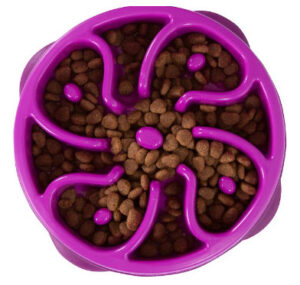
Talk to Your Veterinarian
These are just a few options to help get your fur baby more active and to be able to drop some of that extra weight. Of course, it is important to speak with your veterinarian regarding any types of supplements or training ideas. They will be able to give you insight on what may be best for your dog.
Food to Help My Senior Dog Lose Weight 
Lastly, (but not least!) the quality and quantity of food your dog eats plays a major role in their weight loss. It is important to find food that will help your dog lose weight, but not at expense of overall nutrition.
Quantity
If you live in the United States, you know that even though correct portion sizes remain the same for humans, many of our restaurants serve larger portions and then we tend to increase what is on our plates at home. Now that is a little different for everyone (like extreme athletes, kids, etc…), but as we age, the harder it is to work off that big bowl of pasta.
Consider our senior dogs…the quantity of food is going to rely on breed, size, age, medical condition and activity level. According to the AKC, you can calculate how many calories your dog needs by using the Resting Energy Requirement (RER) formula.
RER Formula
- Take your dog’s weight in Kg, multiply by 30, and add 70 or Take your dog’s weight in lbs and divide by 2.2 and then multiply by 30, and add 70.
- Factor in their Metabolic Energy Requirement (MER) based on health and if they were spayed or neutered.
- Weight loss – 1 x RER
- Neutered/Spayed – 1.6 x RER
- Intact Adult – 1.8 x RER
3. Talk to your veterinarian to have them calculate the RER and to see how your dog can lose weight safely.
Quality
The quality of your dog’s food is a very important factor in helping them lose weight. A lot of processed dog foods will contain carb fillers and not enough of the proteins and nutrients needed. Like in humans, proteins and vegetables help keep your dog full for longer.
I won’t recommend any specific food here because I feel it is a conversation you need to have with your veterinarian. There are so many foods on the market, it can be overwhelming, so talking with your doggy doctor is best. The only thing I can recommend is to choose a quality food where the ingredients are easy to read and understand. This will mean higher proteins and veggies, and lower carbs and fat.
 Treats
Treats
Don’t forget treats either! Monitor the amount and types of treats you give your dog. If you are feeding your baby a healthy meal, but give him or her processed treats, you may not be progressing in the weight loss journey. Instead of feeding your dog processed treats, you can change it up and give them fresh fruits and veggies such as cucumbers, carrots, celery, blueberries, bananas, or apples.
Conclusion
Phew! That was a lot of information to get through, but I know it is important for yours and my dog’s health! Let’s consider all the options to help our senior dogs lose weight and live a long, healthy life.
There are so many food brands and supplement options that I highly recommend talking to your vet before choosing a specific brand.
Let me know if you found anything that worked for your senior dog. Are there any products or activities you found helpful?



